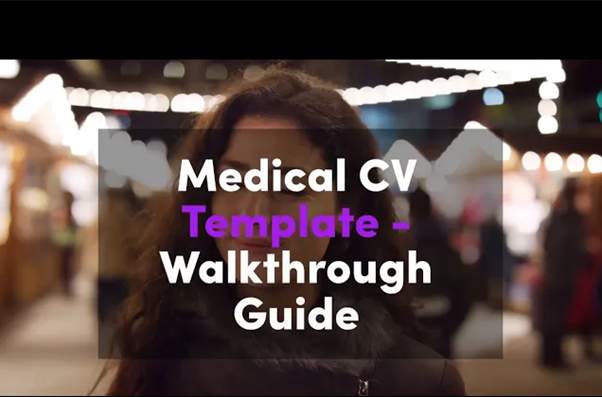
How to Structure an Effective Medical CV
12 Feb, 20258 Minutes
In such a highly competitive job market, your medical CV is often the first impression you make on prospective employers. This applies to any international medical graduate (IMG) or UK-based doctor wanting to secure their dream NHS role.
NHS employers scrutinise CVs meticulously, looking for not just qualifications but a window into the doctor's character, clinical experiences, and skills. Your CV, therefore, serves as the foundation upon which you can build your professional narrative, showcasing why you are the perfect fit for the NHS.
Of course, getting a medical CV right can be tricky. It’s not like a standard business CV; medical CVs tend to be longer and more academic-focused. That requires careful structuring to ensure you provide the right level of detail in the right order.
Our guide will break down each required section and what information you will need to include to create an effective medical CV that will give you an advantage in your job search. Before reading on, check out our video, which will give an overview of writing a medical CV before we explore everything in more detail.
What You Need to Create an Effective Medical CV
A strong medical CV should be clear, concise, presentable, and readable. Remember, a CV is an opportunity to tell your story and why you will make an excellent addition to the NHS. Here are the key areas you must include and the order in which you should format them.
- Personal Information
- Professional Qualifications
- Career Summary and Future Goals
- Competencies, Procedures, and Clinical Skills
- Current Employment
- Previous Employment
- Awards and Accreditations
- Other Relevant Skills and Information
- References
Personal Details
Start with a heading that displays your full name and the NHS position you are applying to. This keeps it simple and easy to categorise for the employer – as soon as they look at the CV, they’ll know who you are and your purpose. This is important for international medical graduates with job titles that aren’t aligned with the UK system – use the title you are seeking rather than your current title to make it clear.
Underneath, you’ll include your key contact details, including:
- Current address
- Email address
- Telephone address
You should also highlight how you’d prefer to be contacted (phone, text, email, etc.), as this will ensure that the employer can contact you and avoid any delays.
Always avoid putting personal details such as your date of birth, marital status, and religious beliefs, as these are not essential or professional for an NHS CV. You should not include a photograph. These kinds of details are protected in the UK and won’t influence your job application.

Professional Summary
Next comes arguably the most important section of your medical CV, the professional summary. This gives the employer insight into whether you are qualified and have the skills and experience to do the job you are applying for.
This part should be comprehensive, listing all your professional qualifications that are relevant to the role. Here is the most logical order that we recommend based on what the NHS want to see:
GMC Registration
Include your GMC registration number, the date you achieved this, and your current license status.
Also, include any details of any regulatory body or medical councils you are registered with. It is worth including them even if your registrations have expired or are inactive, as it will add to your experience.
PLAB or Postgraduate Qualification
Next, you will need to display the qualification you used in your GMC registration application. This will either be your PLAB test results or your postgraduate qualification. There is no need to include school-level qualifications, such as A-Levels.
If your example contains multiple parts, for example, PLAB 1 and PLAB 2, you only need to state the completed exam. An example of the suggested format is:
Professional and Linguistic Assessment Board (PLAB) GMC (UK) 2023.
IELTS or OET Results
Next, you should show proof that your English knowledge is to the standard the NHS requires. International medical graduates usually gain this proof by completing the IELTS or OET assessments.
Whilst you need one of these qualifications to gain GMC registration, it is still important to highlight them on your medical CV as it clearly shows that you are fully prepared to begin a career in the UK healthcare system.
International Qualifications
Display your relevant international qualifications, particularly highlighting relevant training schemes. It’s an opportunity to show what other professional experience you have in your chosen medical field.
Primary Medical Qualification (or MBBS)
Next, write your primary medical qualification, including the institution, the subject, the year completed, and the result.
Personal Summary and Career Goals
For the career summary and objectives, include two concise paragraphs that explain your employment history and career aspirations.
The first paragraph should be a brief overview of your experience to date. It doesn’t need to go into in-depth detail but just highlights the main points, including:
- Where you are currently employed
- Your position
- Your grade
- How long you have worked there
- Previous employment, including dates and positions
The second paragraph is vitally important as it is an opportunity to really sell yourself, your qualifications, and your motivations for working for the NHS. This might include specific career goals. For example, is there a particular position you’d like to achieve or a niche specialism you’d like to move into? Or it may be that your main motivation is just to join the NHS and work in a particular hospital.
The purpose of this section is to make it evident to the employer that you are a motivated and dedicated doctor and that the position you’re applying to will make the most of your passion and skills. So think about what you will write here, as this section will hopefully inspire the hiring manager to read on.

Competencies, Procedures, and Clinical Skills
In this section, you should clearly and in detail demonstrate the specific clinical skills you have attained over the years. This section is particularly important for international medical graduates, as NHS employers must understand the similarities and differences between your experience, training, and qualifications in your home country and what you’ll be doing in the UK. This is not to catch you out but more to discover your strengths and areas where you may need more guidance and coaching.
It’s hard to say how long this section should be, so don’t worry about length. Instead, concern yourself more with including all your clinical skills – even the junior ones! As the NHS might not understand your qualifications and training, you must be clear and thorough.
We highly recommend splitting this into two sections, tasks you can do ‘independently’ and ‘assisted’. You should also try to note down, as accurately as possible, how often you have done these tasks, e.g. every day or 3 or 4 times during your career. By highlighting these different skills, your NHS employer understands where you can excel and where you might need extra support or training.
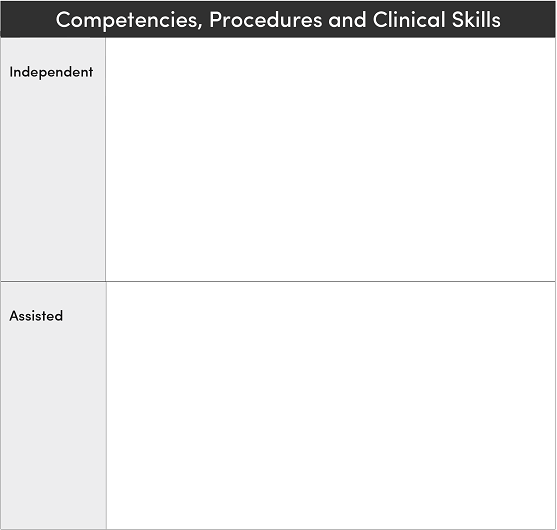
Current Employment
In this section, provide details about your current employer. Include your job title and the hospital you work at, detailing your specific role. What responsibilities do you hold? What do you do day-to-day? Here are some points you should always include:
- Job title – include a note on the equivalent grade in the UK system if you’re an international medical graduate. E.g. Medical Officer (Equivalent UK Registrar).
- Employment Dates
- Duties and Responsibilities
- Type of Hospital - Go into detail, covering key questions such as:
- What type of hospital is it?
- How many beds?
- How many patients?
- Is it a city or rural location?
- Your Department - Again, go into detail:
- How many patients do you see daily?
- What’s the on-call frequency on your rota?
- What are the demographics of the patients coming into the hospital?
If you’re an international medical graduate, it is important to exemplify how your current role is similar to the position you are applying for in the NHS and how it differs. Getting this information right is particularly important, as the person reading it may have little or no idea what kind of job or place of work you’re used to.
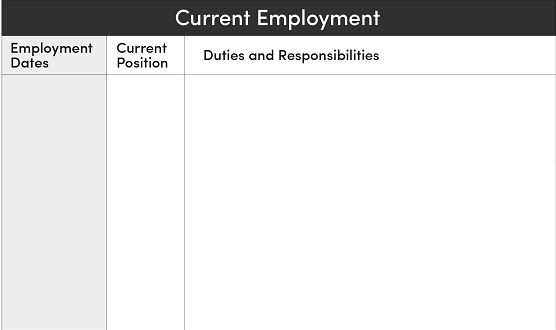
Previous Employment
In the next section, you should discuss your previous employment. This should follow a similar structure to the ‘current employment’. Always display employment history in reverse chronological order, with your most recent employment at the top. So, for example, you’d likely end with your foundation training/internship.
The level of detail you go into in this section depends on how long you have been in your current position. Say you have been in your current position for only a year, you will want to go more in-depth about your previous positions to ensure you show that you have the right level of experience. However, if you've been in the same role for many years, you won't need to go into as much detail about your earlier work experience. 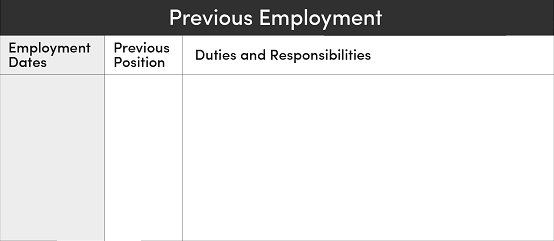
Training Courses and Conference
If you have completed, attended, or been a speaker or lecturer at any training courses, professional development activities, or conferences, add them to your medical CV. You should list them in reverse chronological order.
You need to include the course name, the date, and the provider.
An example of a layout is e-ALS (Advanced Life Support) Course Resuscitation Council UK 2023.
Adding these is important as it will highlight to an employer your specialist interest and what you are passionate about, which will support your application.
Research and Publications
If you have contributed to any research or publications during your medical career, list it here in reverse chronological order. If you have a publication/piece of research you’d like to highlight more, do so by simply going into more detail about it.
Always include this part if you can, as being a part of medical research and publications highlights your dedication and experience in the medical field, which will help you stand out.
Awards and Accreditations
Have you won any awards and prizes in your medical career? If you have, list them here. Include details like who granted it, why it was given, and the dates you were given the award.
Other Relevant Skills and Information
Lastly, include any other relevant skills or attributes you think will help your application. At this point, you can talk about your personality outside of the medical field, including hobbies and interests you may pursue outside of work.
You don't need to go into too much detail in this section. It won't be the deciding factor that successfully lands you a role, but it just adds a touch of personality and allows employers to get to know you from a non-work perspective.
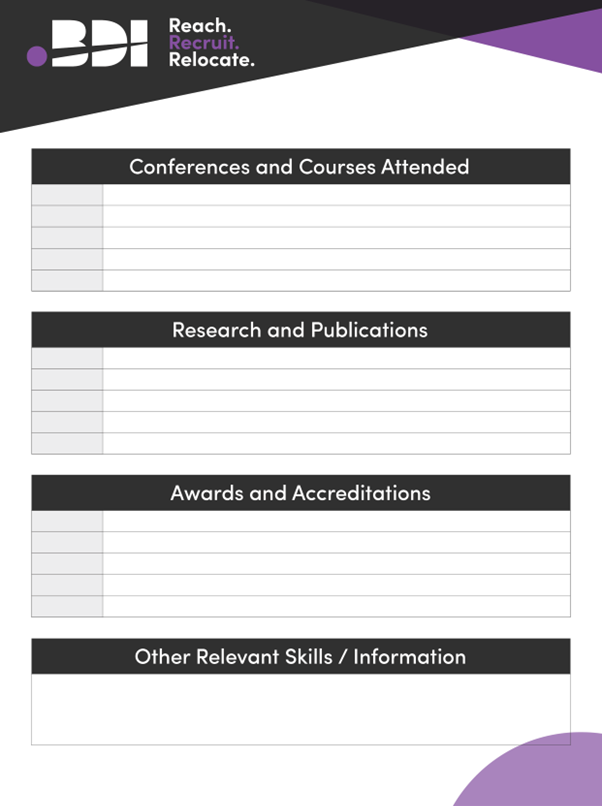
Referee Details
You will need to provide three references that cover three years of work history, and it should be a clinician who is more senior than you.
You need to provide the following:
- Referees' names
- Titles
- Departments
- Contact information
It is important to note that references will not be contacted until after you have been offered a job, so you don’t need to worry if your current employer doesn’t know you are looking for a new role.

Extra Tips for an Excellent Medical CV
Don’t overthink the length
Medical CVs are often more than ten pages long, but they might be shorter or longer depending on your experience and expertise. Focus more on including all relevant information than the length.
Choose a professional font
You need to ensure your medical CV looks professional and readable, so avoid experimenting with colours, sizes, and fonts. Apart from the heading, you should keep font sizes consistent throughout.
To create a high level of professionalism, pick a suitable font. We recommend Calibri, Ariel, Times New Roman, or Sherif.
Address career gaps
If you have any gaps in your medical career, be honest about them and explain what you did with that time, including what you did to maintain an interest in medicine.
Avoid Irrelevant Information
Whilst you want your medical CV to be detailed, you need to avoid waffling and adding information that an employer won’t see as relevant to your application.
When writing or reading through your medical CV, ask yourself, “Will this help me get the job?”. If it doesn’t, remove that information. Remember, keep it detailed but keep it relevant.
Get a Second Opinion
You want your medical CV to be to the highest standard to give you the best chance of landing your dream role. Having a second pair of eyes will ensure you have dotted all the i's and crossed all the t's.
So, once you’ve completed and read through your medical CV, get someone else to review it. They might be able to spot spelling and grammar errors and give you feedback on its general presentation, readability, and layout.

Should You Include a Cover Letter with Your Medical CV?
This is a very common question we get asked by candidates. When you apply directly for an NHS role on NHS Jobs, there is no section for a cover letter, so you might wonder if you need one at all. Our advice is to include one, as it won’t harm your application and provides extra detail to hopefully catch the employer's eye.
Cover letters provide an excellent chance to summarise the specific skills and experience that are crucial for the role you’re applying for and provide an overview of your knowledge about the particular position and the NHS trust. If there’s no section for a cover letter, consider adding one to your medical CV or as an email.
Final Thoughts on Structuring an Effective Medical CV
Structuring a medical CV is critical for any international medical graduate (IMG) or UK-based doctor aspiring to secure an NHS post. The importance of a well-organized and informative medical CV cannot be overstated, as it serves as your initial introduction to potential employers. It is essential to follow a structured approach to make a lasting impression and increase your chances of securing an interview.
Your medical CV should be clear, concise, and professional, providing a comprehensive overview of your qualifications, skills, and character. The order in which you present the information is crucial. It should include personal information, professional qualifications, a career summary and future goals, competencies, procedures, clinical skills, current and previous employment details, awards and accreditations, other relevant skills and information, and referee details.
Download our helpful medical CV template if you’d like further support and guidance in compiling your medical CV. Our expert team can also guide you on your applications and do everything to ensure your next NHS application succeeds.
Need Expert and Dedicated Support for your NHS Job Search?
Once you’ve created an effective medical CV after following our expert advice, you’ll be ready to apply for jobs. At BDI, we are ready and waiting to provide friendly and specialist support to ensure your move to working as a doctor in the UK is stress-free.
Doctors worldwide have already trusted us with their career journey and felt the incredible benefits of our service. Are you ready for us to support you? Contact the team today, and let’s elevate your job search journey.

